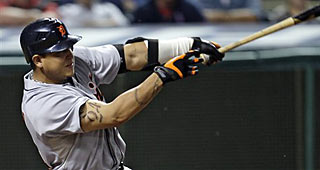Miguel Cabrera made history before the 2014 MLB season even started with his historic 10-year, $300 million contract with the Detroit Tigers.
With reigning NL Cy Young winner Clay Kershaw ($215 million over seven seasons) and five-time AL All-Star Robinson Cano ($240 million over 10 seasons) already receiving sizable raises of their own, Cabrera’s new deal moved the bar for contracts even further.
Entering this season, 21 players are poised to earn at least $20 million, and 12 are position players. Among the group, Ryan Howard (62 missed games), Mark Texeira (147), Joe Mauer (49), Albert Pujols (63), Matt Kemp (56), Jacoby Ellsbury (28), Jayson Werth (33), Carl Crawford (46) and David Wright (50) missed extensive time last season. Lucrative multi-year MLB extensions hardly make for happy endings -- especially when said deals are signed when the player is in, or past, his prime.
Cabrera is nearing 31 and had two seasons remaining before becoming a free-agent, raising questions about the timing of his new deal. But despite Cabrera professing a desire to remain with Detroit, playing the waiting game can be risky -- especially for the first Triple Crown winner since 1967.
Of course, it also feels as though this is familiar territory with Pujols, Alex Rodriguez, and even Cabrera’s recently-traded teammate, Prince Fielder all signing huge deals only to make those teams regret the decision.
When superstar sluggers parlay their home runs and four digit OPS marks into expensive commitments, disappointment has too often loomed.
Pujols has been a shell of himself with the Angels, with his OPS dropping to .859 in 2012 and just .767 in 2013.
Despite winning a World Series in 2009 during his 10-year, $275 deal, Rodriguez has also seen his production fall off radically while also becoming an injury and suspension liability for the Yankees.
Fielder was overshadowed by Cabrera’s transcendence after signing with Detroit for nine seasons and $214 million before the 2012 season. Fielder played in all 324 available games during his two-year tenure with the Tigers, but hit just 30 homers in 2012 and 25 in 2013.
In Cabrera’s case, there was no precedent for the Tigers to negotiate this extension. In 2012, he won his aforementioned Triple Crown, the first since Carl Yastrzemski, along with his first of two consecutive MVPs. He’s only the ninth player in major league history with three-consecutive batting titles, becoming the first AL player since Wade Boggs (1985-87) and first Tiger since Ty Cobb (1917-19) to accomplish the feat.
On the surface, Cabrera seems poised to become another slugger full of historic relevance and promise only to show his mortal self as he gets further into his thirties. But Pujols and Rodriguez, among others, showed their mortality before their deals.
Pujols is already a relative bust for the Angels, but the contract was also signed after his worst statistical season with the St. Louis Cardinals. He had his fifth-lowest HR total (37), worst batting average (.299) and worst OPS (.906).
Unlike Pujols, Rodriguez's monster deal came after his third MVP (54 HR, 156 RBI, .314 BA) and before he was linked to performance enhancing drugs. But despite those numbers, Rodriguez never fully justified his monster contract and included bonuses for rising the all-time home run list as the Yankees planned to pay for value that went beyond the field.
Justifying a $30 million salary will be laborious for Cabera, especially without Fielder offering lineup protection. With age for most players, bat speed slows, power diminishes, and skills ultimately erode. Many become a lesser version of themselves, leaving their All-Star production a distant memory.
The Tigers are banking on Cabrera’s historic precedence outweighing contractual precedence, where 10-year deals are considered a death sentence. Fielder’s deal proved burdensome because pull-happy sluggers don’t age well and the Tigers traded him before the secret was out.
On the other hand, when Cabrera is 36 and halfway through his contract, a steep decline isn’t guaranteed -- especially compared to several all-time greats.
At age 38, Ted Williams batted .388, with 38 homers and recorded a .526 on-base percentage, even batting .328 the next year.
The former home run king, Hank Aaron, hit .301, 40 home runs, 96 RBI, recorded a .401 OBP and made the All-Star team at age 40.
Moreover, Barry Bonds, at age 36, started a run of four-straight MVPs, averaged 52 home runs, 110 RBI, 189 walks, never hit lower than .328 and averaged a .559 OBP, winning two batting titles. Even noting his alleged PED usage, those are numbers no one has ever recorded, especially during their “twilight” years.
As for Cabrera, he, too, can perform well into his mid-late thirties. He’s finished top-five in MVP voting seven of the past nine seasons, ranking top eight in batting average in eight of those years. Assuming his seasonal averages of 181 hits and 33 home runs hold for seven years, he’ll join Aaron as the only players ever with 3,700 hits and 500 home runs.
Just as impressive, Cabrera can join Williams, Babe Ruth and Jimmie Foxx as the only players with a career .320 average and 500 home runs.
Regardless of recent failed ten-year agreements, the Tigers were right to invest so heftily in Cabrera. The odds suggest his twilight years will entail an undeserved, $30 million salary, but he may just be exceptionally good enough to defy expectation.


